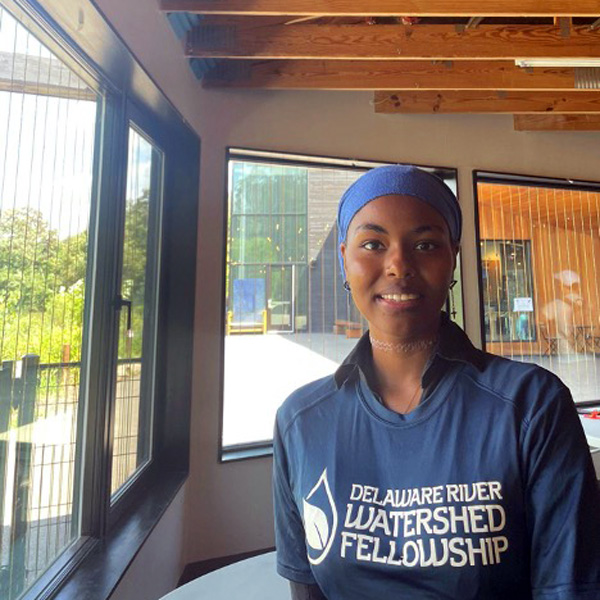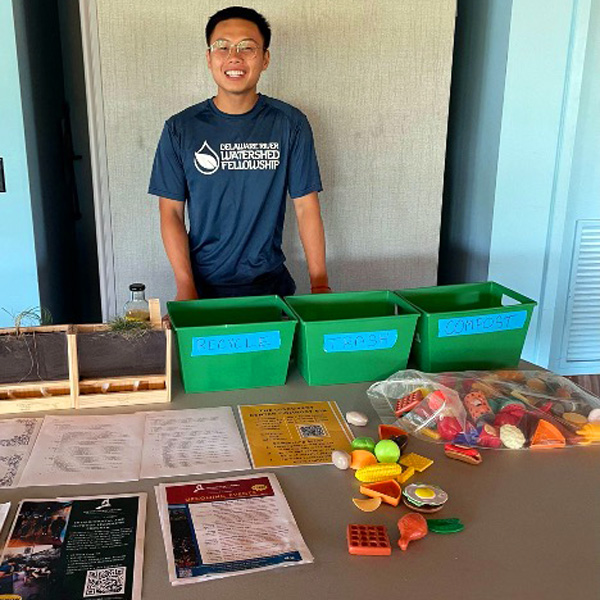
Connecting Future Stewards: Delaware River Fellows’ impact on conservation and community
Cultivating Generations of Intersectional Environmentalists
For the past seven years, the Delaware River Watershed Fellowship has connected fellows to one of the 23 Alliance for Watershed Education of the Delaware River (AWE) environmental education centers in Pennsylvania, New Jersey, and Delaware. Supported by center staff, the fellows contribute their wisdom, skills, and passion for community and conservation to “encouraging the enjoyment, use, and care of the natural areas in the Delaware Watershed.”
This year’s Fellows presented their experiences over the 12-week paid program at the Discovery Center on Friday, August 18, following a keynote from Intersectional Environmentalist Co-Founder and Executive Director Diandra Esparza. This pioneering organization, informed by Law professor Kimberlé Crenshaw’s intersectional theory and the 17 Principles of Environmental Justice, has become a leading resource for diverse environmental education.
Esparza discussed the harm that results from the silencing and erasure of BIPOC, disabled people, and other communities from the history of environmentalism – and the importance of telling a complete history with the inclusion of previously excluded communities. She also explored “Artivism,” specifically, the role of art in environmental movements throughout history, and described how art and cultural practices are often interwoven with a relationship to the land.
Following Esparza’s keynote, the Fellows took to the podium to present their projects. Two of the projects include increased accessibility and education.
Accessibility at Bartram’s Garden

Ammarava Mika-El has worked at Bartram’s Garden since 2019 when she served as a Denkyem River Guardians intern at age 15. After experiencing challenges with people physically accessing boats or language barriers, the inspiration of Mika-El’s capstone project was clear. Mika-El increased adaptive paddling for disabled constituents who actively use Bartam’s dock while increasing language options for signage, materials, and resources.
Mika-El enjoys seeing families come to spend time outdoors together, trying boating week after week, and watching children grow. She urges younger youth to get out in greenspaces and do what they can – even the small things. “What’s important is: if you see litter, pick up the litter. Eventually, it will go into the river because of our sewer system. If you want a rain barrel, that will help with our flooding issue,” said Mika-El.
Engaging Outreach Materials at the Discovery Center

Complete with trails through a beautiful native pollinator garden, an Outward Bound obstacle course, and stunning views of the East Park Reservoir, the Discovery Center is a must-see. The newest attraction is a composting system designed and built by Su Ly.
Ly grew up close to the Discovery Center but didn’t know it existed. During the summer of seventh grade, Ly participated in the now-defunct Environmental Protection Agency’s Student Environmental Development Program. “It was a crash course into the environmental issues that we have. (The EPA Staff) took us out to the Potomac River and the headwaters, where we got to do a little scuba diving, which sparked my interest in environmental issues,” said Ly.
A recent graduate of the University of Pennsylvania’s Master of Environmental Studies, Ly created educational materials and displays for his fellowship. The compost system and portable pollinator/native plant box are accompanied by lesson plans for the center’s Education Team – or any educator.
Ly taught five lessons to students from a community partner school on topics ranging from pollinators and birds to adaptation. He highlighted, “The overarching goal is to get them interested and engaged in this space. And that’s really what the fellowship is about.”









